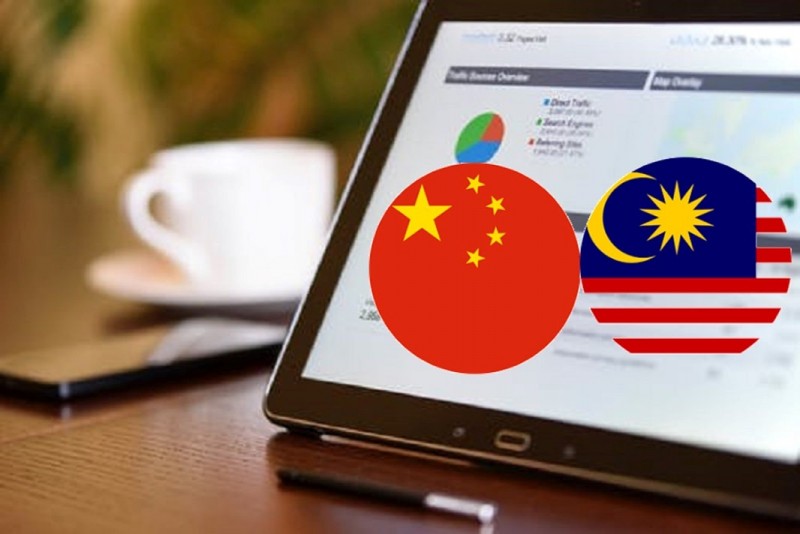
Image credit: OpenGov Asia
CHINA is undeniably a prominent financial market for Malaysian investors, given its growing financial sector and the rapid expansion of its corporate and financial investments globally.
This is particularly evident since China’s financial liberalisation, where various reform policies on the country’s financial markets were implemented - including on its stock exchanges.
At the same time, Chinese investors are also seeking investment opportunities beyond their national borders, notably in Asean countries.
Located at the heart of Asean, Malaysia is an important gateway to one of the world’s fastest growing regions.
In order to promote investment flowing between Malaysia and China, stock exchanges and regulators of both countries have established numerous cross-border collaboration initiatives through the years.
For instance, Malaysia was recognised as an approved destination for investment under China’s Qualified Domestic Institutional Investor (QDII) programme in 2010.
This recognition has facilitated the flow of investment funds from China into Malaysia and created new business opportunities for the Malaysian capital market intermediaries, which marked a major step forward for the Malaysian capital market.
The QDII is a programme which allows approved institutions to invest funds on behalf of their clients from China into various securities in Malaysia such as equities, fixed income instruments and collective investment schemes approved by the Securities Commission Malaysia.
Besides, these Chinese institutions may also appoint licensed Malaysian fund managers to provide assistance and services in matters related to QDII investment.
In 2012, Bursa Malaysia Berhad (Bursa Malaysia) signed a Memorandum of Understanding (MoU) with the Shanghai Stock Exchange (SSE) to collaborate for the mutual benefits of the financial services industry in Malaysia and China.
Under the terms of the MoU, both exchanges agreed to improve their information sharing by facilitating the development of proper communication channels.
Other salient aspects include structuring listed products, corporate governance, development of debt securities instruments and debt trading facilities, staff exchange or secondment, and research projects.
Subsequently, in 2017, both exchanges entered into another MoU to explore potential avenues to enhance their visibility and accessibility to investors in Malaysia and China.
The MoU also outlined that Bursa Malaysia and the SSE will cooperate to improve the flow of information between both capital markets and address structural issues that may impede market accessibility.
In 2020, the Malaysian capital market achieved another significant milestone in its effort to deepen collaboration with China, where Bursa Malaysia entered into an MoU with the Shenzhen Stock Exchange (SZSE) with the objectives of broadening investment opportunities and facilitating greater cross-border collaboration between the two countries.
Among others, these include the facilitation to display selected mutual benchmark indices of its respective markets on the websites of both exchanges and cross promotion of the indices and their constituents to raise the profile and visibility of both the Malaysian and Chinese capital markets.
One of the notable indices is the CNI-Bursa Malaysia 50 Index, which is a new index jointly developed by Bursa Malaysia and the SZSE.
This index tracks the performance of the 50 largest companies listed on the Bursa Malaysia based on the free-float weighted market capitalisation in accordance with the Shenzhen Securities Information Co. Ltd. methodology.
Other indices include Shenzhen 100 Index, Shenzhen Component Index, ChiNext Index, Bursa Malaysia Health Care Index and Bursa Malaysia Technology Index.
In addition, the MoU also comprised a plan for information sharing, human capital and technology development as well as other business development cooperation for the mutual benefit of both exchanges.
Meanwhile, there are several exchange-traded funds (ETFs) listed on Bursa Malaysia that invest in China equities.
In 2010, the Principal FTSE China 50 ETF became the first China-focused ETF listed on Bursa Malaysia.
Launched by Principal Asset Management Berhad, this fund aims at investing in Chinese stocks listed on the Hong Kong Stock Exchange.
This was followed by the introduction of the second China-focused ETF in 2019 by Affin Hwang Asset Management Berhad called the TradePlus S&P New China Tracker.
This fund replicates the performance of the S&P New China Sectors Ex A-Shares Index and thus offers investors exposure to Chinese new economy stocks.
More recently, the VP-DJ Shariah China A-Shares 100 ETF was launched in 2021, which provides exposure to the largest 100 Shariah-compliant shares listed on the SSE and SZSE (also known as the China A-shares market).
In fact, this is the first A-share ETF in the world that tracks the Dow Jones Islamic Market China A-Shares 100 Index.
This was made possible through China’s Renminbi Qualified Foreign Institutional Investor (RQFII) programme, where Malaysian investors are permitted to invest in the China A-shares market.
The RQFII programme, which was introduced in 2011 and is jointly administered by the China Securities Regulatory Commission, the State Administration of Foreign Exchange and the People’s Bank of China, aims to provide foreign investors with greater market access to invest in the Chinese market.
With Malaysia being recognised as one of the RQFII jurisdictions in 2015, qualified Malaysian institutions are allowed to issue Renminbi investment products to the investors.
This also serves as an avenue to utilise offshore Renminbi for investments in the Chinese capital market.
Besides, a handful of Chinese companies have sought listing on Bursa Malaysia over the recent decade, which has added to the breadth of companies listed on the local bourse.
In a nutshell, these collaboration initiatives have benefited both exchanges via the sharing of valuable information as well as the exchanging of ideas and experiences.
Moreover, these initiatives have enhanced investors’ accessibility of both markets and promoted investment flows between Malaysia and China, contributing to increased liquidity in both capital markets.
It is hoped that the stock exchanges of both countries will continue with this cross-border collaboration to yield more fruitful outcomes and deliver greater value for the investors.
Source: https://www.thestar.com.my/opinion/columnists/search-scholar-series/2022/04/03/malaysia-china-stock-exchanges-collaborate-to-broaden-investment-opportunities

